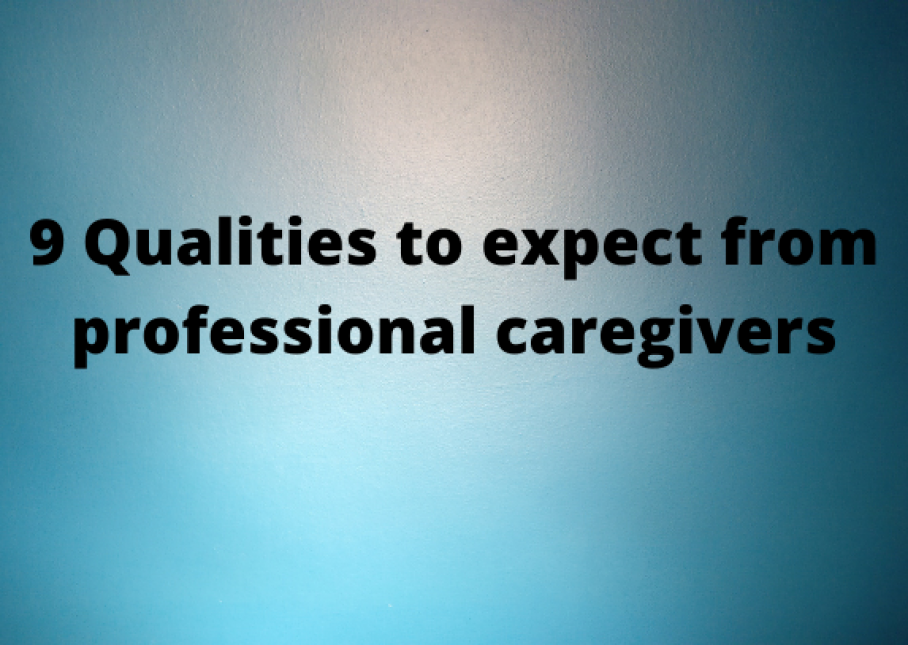
A responsible caregiver is someone who is aware, diligent, and really cares about their patients. Client duties are assigned to each caregiver. A responsible caretaker not only adheres to those responsibilities but also responds to additional needs without being asked. Responsibility also involves adherence to business standards such as punctuality and attendance at staff training. When things don't go as planned or a mistake is made, it implies accepting responsibility and not blaming others. If you're a family member or friend looking to employ a professional caregiver, you'll want to make sure you pick someone who is a good fit for your loved one. Although predicting who would connect and be the greatest person might be difficult, there are several key characteristics to look for in a competent professional caregiver. Here are seven of the finest traits to look for in a caregiver so that you can tell right away if you and your new caregiver are a good match.
9 Qualities expected from Homecare Agencies and Caregivers
1. Compassion
Compassion is being able to detect other people's pain and having a strong desire to alleviate it. This is the first quality on the list since many home health customers are in uncomfortable and even painful situations (recovering from surgery, losing memory due to Alzheimer's, etc.). As a result, being compassionate and sympathetic is an absolute must-have in terms of caregiving traits. Compassion may not be a "hard" talent in the same way that clinical knowledge or time management is, but it is no less important in a caregiver job.
2. Observation
It is not enough to just converse with or listen to your patients. They may be unable to express what is wrong with their health at times, or they may intentionally conceal anything from you if they are frightened of reporting any deterioration in their condition. During your home visits and other contacts, you must keep a close watch out for any changes in your patient's condition and record them in your report. Maintaining awareness of the client's surroundings is also vital since you'll want to address any dangers such as tripping, fire, and so on.
3. Interpersonal abilities
Working as a caregiver is an extremely social profession that requires you to contact others all day. It is not necessary to be an extrovert to work as a caretaker, but it certainly helps. A high degree of social skills can help you develop rapport, build trust, and overall cultivate a solid, open connection with your clientele. These interpersonal skills will benefit not just you, but also your customers, as many home health patients feel alone. Interacting with a caregiver might help alleviate some of those lonely sensations.
4. Communication
Caregivers must have strong written and vocal communication abilities. Even if your client is unable to communicate via traditional means such as speaking and writing, you will need to contact their family members or other caregivers to discuss their care and status updates. You will very certainly need to communicate with physicians, nurses, and other medical experts, as well as transmit their orders to the patient and/or family.
5. Cleanliness
During their visits, many caregiver assist with modest cleanings, such as laundry or mopping, especially if the client is old. (However, heavy-duty chores such as moving furniture, cleaning carpets, or mowing the lawn are not included in the scope of service.) Even if you don't keep your own house as tidy as you'd want, you'll need to be able to clean your patient's house until it's spotless. This guideline also extends to personal hygiene, since you will most likely need to assist your client with bathing and dressing.
6. Physical stamina and strength
Caregivers are required to undertake a range of physical chores, such as carrying groceries, vacuuming, and lifting patients. Caregivers, no matter what they do, are frequently on their feet for extended periods of time, sometimes for the whole of their shift, which is why having comfortable shoes is critical! Maintaining your own and your client's health requires a basic degree of physical strength and stamina.
7. Initiative
Caregivers frequently work alone in the patient's home. Obviously, they will be given instructions by physicians and nurses on wound care, medicines, and so on, but non-medical care differs from other medical settings in that you do not have a doctor checking off on your every step. As a result, caregiver must feel at ease being proactive, making educated judgments, and acting in an emergency.
8. Time Management
Even if you work for a caregiving service, you are primarily in charge of organizing your time and ensuring that everything is completed within a shift. As a result, you must be able to prioritize activities, work effectively, and avoid becoming mired down in excessively time-consuming chores when time is limited.
9. Patience
The majority of home health customers are coping with one or more of the following issues: substantial mental and/or physical illnesses, restricted communication abilities, and so on. Clients might be unreasonable or critical (or both), necessitate cleanup after mishaps, and otherwise cause a slew of problems. Caregivers must be cool in these situations, thus having a near-unflappable demeanor is critical for good patient care.
The elderly care tenders arranged by 60Plus India are experienced, certified personnel that are vetted by us and can take care of the needs of the elderly, monitor their health and also provide nursing services when required.